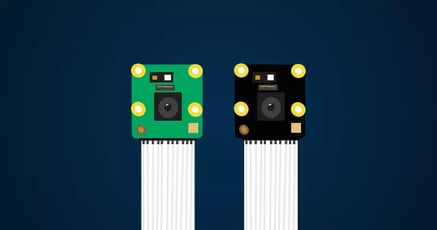The recently released Raspberry Pi AI Camera is an innovative new camera module that combines high-quality imaging with on-board AI capabilities.
What's new about Raspberry Pi AI Camera?
In short, the Raspberry Pi AI Camera features a 12.3MP Sony IMX500 sensor with built-in AI acceleration, allowing on-device processing without taxing the Pi's CPU or GPU.
Build around the Sony IMX500 Intelligent Vision Sensor
Explained in more detail, the Raspberry Pi AI Camera is built around the Sony IMX500 Intelligent Vision Sensor, which integrates a 12.3 megapixel image sensor with an AI accelerator. The vision sensor is paired with a RP2040, a microcontroller chip designed by Raspberry Pi.
The RP2040 makes communication between the main Raspberry Pi board and the Sony IMX500 Intelligent Vision Sensor possible. Although, the RP2040 microcontroller is not directly involved with the AI processing itself. The actual AI inferencing is carried out by the AI accelerator integrated in the Sony IMX500 sensor.
AI capabilities
The Sony IMX500 sensor can perform complex image analysis tasks directly on the sensor, reducing the need for external processing power. As a result, on-board processing is freeing up the connected Raspberry Pi' resources for other tasks.
Meanwhile, the sensor is capable of real-time analysis of visual data including handling various types of neural network models, such as:
- Object detection
- Image classification
- Pose estimation
- Segmentation
Hardware specifications
The Raspberry Pi AI Camera features the following set of specifications:
- Resolution: 12.3 megapixel, 4056 x 3040 pixels
- Sensor size: 7.857 mm, 1/2.3" type
- Aperture lense size: F1.79 aperture
- Field of view: 66° horizontal
- Focus: manual adjustable focus, 20 cm to infinity
- Dimensions: 25 x 24 x 11.9 mm
Resolution and pixel specs, ensuring high-quality and detailed photographs. The 7.857 mm sensor size (1/2.3" type) and F1.79 aperture provide excellent light sensitivity and depth of field, making it suitable for various lighting conditions.
Additionally, the camera features a 66° horizontal field of view and manual adjustable focus, allowing users to fine-tune their shots from 20 cm to infinity. It has the same form factor as the Raspberry Pi Camera Module 3 but is a bit thicker. Both camera modules are easy to integrate into a broad range of projects, from DIY electronics to professional applications.
Pricing
The new AI Camera comes at a guide price of 70 US dollars. No worries if you do not need the AI features, Camera Module 3 is still available at 25 US dollar. Providing Raspberry Pi users with an affordable alternative.
Setup and usage
The Raspberry Pi AI Camera can be connected to a Raspberry Pi using a standard camera ribbon cable and the CSI port. The AI Camera therefore can connect to any Raspberry Pi that supports the camera ribbon cable. It is working with: Raspberry Pi 5, 4B and other versions.
For the camera module to work, the operating system running on the Raspberry Pi must support the new camera module. Check compatiblity and out standing updates up front.
The camera's AI capabilities are well-integrated within the Raspberry Pi software ecosystem:
- Compatible with TensorFlow Lite framework
- Integration with libcamera and Picamera2 libraries
- Support for tensor metadata output alongside video frames
Here's how:
- Raspberry Pi AI Camera - How to get started
- Raspberry Pi AI Camera - Documentation
- Raspberry Pi Ai Camera - Software stack
- Raspberry Pi AI Camera - Product details
Raspberry Pi AI Camera applications
The versatility of the Raspberry Pi AI Camera makes it a good fit for a lot of applications. In the field of security, it can be used to create surveillance systems that can detect and alert users. In retail, it can help analyze customer behavior and optimize store layouts.
Other applications include smart home devices, where the camera can recognize individuals and trigger specific actions. The applications are countless, limited only by the user's creativity.
Support by emteria's Android version
The Raspberry Pi AI Camera will soon be supported by emteria's Android version, which brings the Android operating system to the Raspberry Pi platform. Allowing users to develop and run Android applications that make use of the new camera's AI capabilities.
Subscribe to our newsletter (sign-up form in the footer of this page) to receive updates on Raspberry Pi AI Camera support, Android 15 for Raspberry Pi, rumors revolving around a Raspberry Pi 500 release and other Raspberry Pi and Android news.
Sources:
- Raspberry Pi - AI camera product brief
- Raspberry Pi - Product details - AI Camera
- Raspberry Pi - Naush Patuck - Raspberry Pi AI Camera on sale now at $70
Raspberry Pi - Documentation - AI Camera - Raspberry Pi - Software stack - AI Camera
- Gareth Halfacree - hacker.io - Raspberry Pi's AI Eye (great and thorough article)
- Les Ponder - tom's Hardware - How to Get Started with the Raspberry Pi AI Camera
Power your Raspberry Pi 5 with Android 15
Save your free Android OS plan with all features and no time limit — build products powered by Android 15.
No credit card required.







